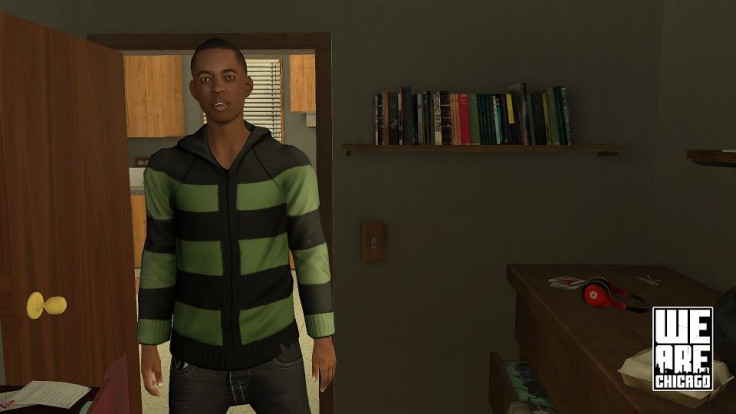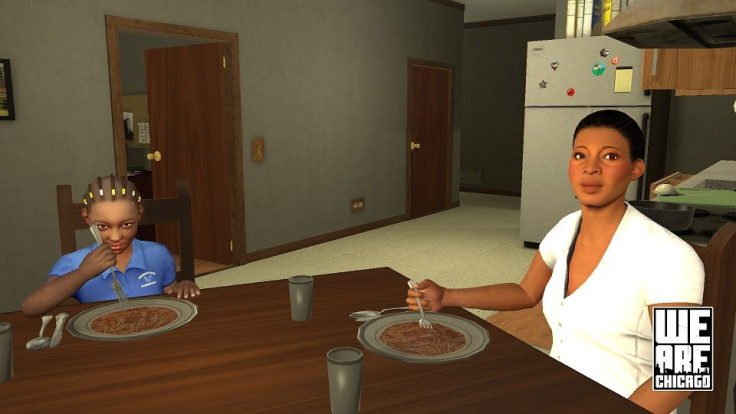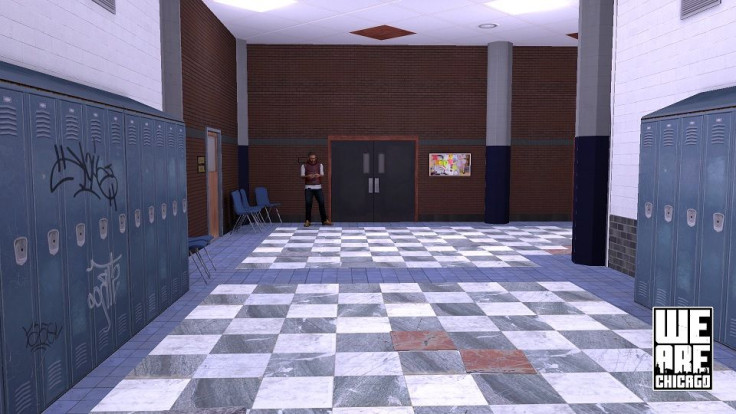Few developers are willing to tackle the kind of subject material we’ll see in We Are Chicago when the game heads to PC, Mac and Linux later this year. But that’s why Culture Shock Games, an independent studio based in Illinois’ most populous city, thinks it’s so important for the general public to grapple with the only image of Chicago being presented by mainstream media.
If you aren’t familiar, We Are Chicago is a Telltale-like narrative adventure, set in Chicago, which tells the story of an 18-year-old high school student, Aaron, near the end of his senior year. As you’d expect, this means grappling with the anxiety and excitement many us felt about life after graduation. But Aaron will also face challenges many players have never experienced: the obstacles presented by life in Chicago’s notorious South and West Side neighborhoods.
On its website, Culture Shock Games says it “tells true stories through video games” with the goal of contributing to public discourse surrounding social issues and providing a platform for voices from underrepresented communities. In some cases, that means tackling subject matter fans might not know intimately. We had a chance to speak with Michael Block, founder of Culture Shock Games and project lead for We Are Chicago, about why he believes development of the game is so important and early responses from the very people the game hopes to represent.

In the demo we were shown, Aaron and his friends talk about their plans for college (or lack thereof) and what they think life will be like now that society sees them as adults. But the characters introduced in We Are Chicago also struggle with bigger issues: complex feelings of anger and grief felt by victims of a violent crime, the growing inability to shelter children from that violence, concerns that life in Chicago’s roughest neighborhoods is inescapable amid pressures to take up gang life. And that’s just the start.
We Are Chicago won’t just be a three-hour conversation about the causes and effects of gang violence. But Culture Shock believes it would be an unrealistic portrayal of life in the affected neighborhoods if We Are Chicago didn't address the subject. At times, the player can even defend some of Aaron’s gang-affiliated friends in conversations with other characters. But the studio’s goal isn’t to present gang life as a viable alternative to the standard (law-abiding) career path or to glorify the violence that’s become commonplace in some parts of the city. Instead, Culture Shock’s goal is to highlight the unseen forces that frequently motivate such acts and to put a human face on the thousands of people affected by the city’s troubles.
“The focus of the game is really to tell the personal stories behind the statistics you hear on the news,” Block told iDigitalTimes. “When you hear ‘Record number of shooting deaths on the South Side over the weekend’ that just gives you this number that doesn’t really mean a whole lot. We see this stuff and it happens so often that we’re desensitized to it. We don’t correlate it to a real person. We don’t correlate it to a family that lost a son or somebody who is suffering.”
“[We Are Chicago] is trying to lend a personal narrative to that and to show there are real, complex, nuanced people behind these statistics that you’re hearing about. And their lives are being dramatically affected by these events. So we want to have a discussion about that and how we’re handling it as a society.”
Some of those discussions will make players uncomfortable. One such conversation takes place at the dinner table, after the evening meal is interrupted by the sound of gunfire. Aaron has a chance to speak with everyone at the table, either about what they just heard or other events of the day, but my prolonged conversation with Aaron’s little sister turned out to be absolutely heartbreaking.
Aaron’s sister is understandably scared, having just heard the sound of a firearm, and players can try to console her if they wish. But if you continue talking she reveals the source of her anxiety. Turns out, a classmate recently recounted the story of another young student killed by a stray bullet that passed through her living room window. With several windows visible from the dinner table, Aaron’s sister is scared she (or someone in her family) could be next. It’s a heartbreaking conversation, one of many in which there don’t seem to be any right answers.

Culture Shock is taking a decidedly different approach to game development, one that focuses on educating gamers while simultaneously providing them with enough entertainment to keep them hooked. The studio knows the relatively serious subject matter won’t be for everyone. But We Are Chicago is already beginning to find an audience, despite limited press coverage and the game’s current lack of a concrete launch date.
“The response has been really great. Everybody is very excited. If you present [We Are Chicago] as ‘This is a really interesting and compelling narrative experience,’ that gets people in,” Block said. “And once they realize the characters are engaging and the environment is interesting, people don’t care that it’s a more serious game. They’re just excited to play a good story. And I think that’s what we’ve been trying to accomplish. Just tell a good narrative and educate people on the side.”
Culture Shock is aware the lives portrayed in We Are Chicago differ significantly from those lived by most of its employees. The studio has lifelong Chicagoans on its roster but that doesn’t mean the staff has experience with all the topics addressed in We Are Chicago, particularly the game’s criminal elements. Rather than dream up a story, incorporating so many different topics in an honest manner, Culture Shock interviewed South Side and West Side residents about their lives. The studio even reached out to non-profit organizations that work in those communities to ensure a greater diversity among those interviewed.
All of the interviews were then given to a writer from Englewood, one of the city’s most dangerous neighborhoods, who was asked to create dialogue for We Are Chicago. As a result, the game’s conversations are refreshingly devoid of the impression that someone in their 30’s or 40’s is trying to sound like a teen. Conversations between Aaron and his friends/family feel like the kinds of discussions people have every day. Teenagers crack jokes at one another’s expense or get defensive when it feels like their peers are talking down to them. Similarly, Aaron’s demeanor is noticeably different when walking with a friend as opposed to eating a meal with his family.
Thankfully, Culture Shock isn’t content to create a game focused entirely on the negative aspects of life in Chicago. It’s important to the studio to show that life in the city still exists on both ends of the spectrum. Chicago is experiencing tough times but that doesn’t mean there aren’t beacons of positivity in the same communities grappling with these problems. To find those beacons, Culture Shock took time to ask interviewees about their positive memories and the experiences people weren’t sure they could get anywhere but Chicago.
To the studio’s surprise, poetry slams were one of the most commonly mentioned influences by those interviewed. Naturally, the team included one in We Are Chicago , going as far as to have the player directly participate in the event. Additional details on that portion of the game aren’t available at this time, since it isn’t being shown yet; however, Block says we can definitely expect to see a poetry slam in the launch build.
“To bring in the positive as well helps make it a more complex and nuanced story,” Block said. “I also think the multiple choice options that are showing you the ways that people respond paints a more nuanced picture and a less monolithic picture. It’s not like ‘This is the choice that Black people have to make on the South Side and this is how all Black people respond.’ It shows a much more human picture of the people living in those communities.”

As Block mentioned, it’s important to Culture Shock that We Are Chicago not become a monolithic representation of the communities it portrays. The studio is also aware that a close examination of gang life, through the eyes of an African-American family, might draw major side-eye from outside observers; particularly those unfamiliar with the project. But the studio is confident in its portrayal of Aaron and his family. Block also rejects the idea that Culture Shock should alter its portrayal of daily life in We Are Chicago to deliver a more politically-correct story.
“It is unfortunate but a lot of these things are happening in neighborhoods that are predominantly African-American,” Block said. “And so to take it out of that setting does a disservice to the experience. We’re trying to tell these stories as they actually are.”
A need to tell stories as they are, not as players want them to be, is also why Culture Shock doesn’t let players skip any of the major plot points in We Are Chicago.
“The things we decided to talk about, we wanted you to experience all of those things,” Block said. “So you can’t necessarily diverge the story to the point where you’ll miss events in the narrative but at the same time we wanted [the player] to have an impact on the story. So we’re basically using inter-personal relationships as the way you influence things.”
Without a doubt, We Are Chicago feels like one of the year’s most important releases. It proves video games can tackle serious subjects in a mature way. More importantly, the project gives context to those who might toss around the “Chiraq” moniker without considering the loss of life that led to its adoption. And (hopefully) We Are Chicago gives people a chance to understand the truly terrible circumstances that occasionally lead people to make terrible life decisions.
“We’re getting the point across that these aren’t good experiences. But at the same time, we want to paint a more nuanced picture and say ‘There are all these societal reasons why people choose to join a gang,’” Block said. “We don’t necessarily have to say it’s right but we can understand why people are making those choices. And that, I think, makes them less of a boogeyman."
“You may not agree with those [reasons]. But you’re not in that position...to say for sure that you wouldn’t make the same choice.”
But this isn’t the only story Chicago has to tell. Block also sees an opportunity to apply this formula to stories of other marginalized communities in the Chicagoland area.
“In [We Are Chicago] we’re talking kind of specifically about the African-American experience. And there’s whole neighborhoods on the south side that are Hispanic neighborhoods. And those are completely different stories,” Block said. “They have a ton of different problems that are unique to the Hispanic experience in Chicago…so there’s lots of other possibilities to explore with this concept and we’d definitely be up for doing that.”
***
We Are Chicago is in development for PC, Mac and Linux. The game is expected to debut this fall and could eventually be released on PS4 and Xbox One.
Be sure to check back with iDigitalTimes.com and follow Scott on Twitter for additional We Are Chicago coverage throughout 2016 and for however long Culture Shock Games continues to support We Are Chicago in the months following launch.


















